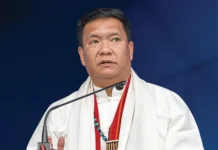[Amitabh Kant]
India’s G20 presidency comes at a critical juncture and an opportune time. Countries across the world are looking to build back better from the host of crises experienced over the past three years. From the Covid-19 pandemic to the ongoing climate crisis, it is now well-acknowledged that the impacts of a crisis are very often gendered, exacting their highest price on women and girls, impacting their safety, livelihoods and health.
India’s presidency of G20 brings an enormous focus on the role of women and gender equality. Prime Minister Narendra Modi has highlighted the imperative need for tackling critical issues of women’s access to finance, entrepreneurship, and labour force participation.
On the domestic front, the government of India has taken a conscious decision to place women’s empowerment at the heart of its Atmanirbhar Bharat development agenda, with a commitment to support their holistic development at all stages of life. The ‘Beti bachao, beti padhao’ scheme has led to a 16-point improvement in the sex ratio at birth since 2014. The MUDRA scheme that provides microfinance has over 70 percent women beneficiaries. Mission Poshan 2.0, an integrated nutrition support programme, has served over 1.2 crore pregnant and lactating mothers. Several other steps, from the establishment of working women’s hostels to the launch of various skills-development programmes and initiatives to secure their safety and freedom from violence – all testify to India’s concerted focus on securing the suraksha (safety), suvidha (convenience) and swabhimann (independence) of their women.
Increasingly, and in line with our society’s civilisational ethos, the government is also recognising the centrality of ‘Nari Shakti’ to affect meaningful society-wide transformation. Simply put, there is a greater focus on the role of women as drivers of growth and agents of changes, and not simply as beneficiaries of development.
With India steering the efforts of the G20 in 2023, the time has come for us to build on the momentum generated so far, and further this agenda of women-led development. Given that gender is a cross-cutting theme affecting almost all the other development prospects, we hope to see a renewed emphasis on gender equality across the entirety of the G20 agenda, and its engagement groups.
In particular, we look forward to advancing concrete actions on the following themes:
First, supporting women’s digital and financial inclusion: Globally, almost half (42 percent) of women and girls remain outside the formal financial system. Despite progress in financial inclusion rates, the gender gap has not narrowed and a 7 percent gap persists. Digital technology innovations, particularly for information & communication, have the potential to accelerate women’s economic empowerment. Yet, there remains a digital gender gap, both in access to digital technology and to digital education. India has prioritised women’s digital financial inclusion through the JAM or Jan Dhan-Aadhar-Mobile platform, and this has allowed significant social protection programmes to reach women directly, as well as strengthened and women’s economic empowerment. Through the G20, we must look at similar concrete ways to strengthen women’s digital and financial inclusion.
Second, strengthening women’s capacities to make them equal stakeholders in development: This is important both to facilitate the entry of, and to ensure continuity in women’s participation in the economy and in society. For instance, despite education being wholly acknowledged as the cornerstone of empowerment, globally only 49 percent have achieved gender parity in primary education, 42 percent in lower secondary education, and 24 percent in upper secondary education. Globally, around 1.1 billion women and girls remain outside the formal financial system, many of whom also have limited access to digital technologies. Similarly, in countries across the world, women perform significantly higher unpaid care work. Therefore, it is crucial that the G20 works together and drives consensus and actions around dismantling these long-term structural barriers that women face and their lives and at work.
Third, enabling women’s leadership at all levels of decision making: Today, India is being served by over 1.90 crore women in administrative offices, over 17,000 women elected to panchayati raj institutions, and over 10,000 women in the defence forces. Such an approach to women-led development will be critical for ensuring that their unique perspectives, experiences and leadership styles are brought to the table, which in turn can lead to more inclusive and effective decision-making.
Finally, it is important to ensure the sustainability of the outcomes realised across various initiatives. For this, prioritising gender-disaggregated data systems will be critical, as investing in the collection and sharing of gender- disaggregated data will be important for developing targeted interventions, and monitoring progress towards gender equality.
Although the interlinked crises the world has faced has set us back from achieving our common development goals, India’s G20 presidency offers the opportunity for us to set the agenda for the next phase of development. In this window of opportunity, it is critical that we place women at the heart of our efforts, so as to achieve a better tomorrow. (The contributor is a G20 Sherpa and former CEO of NITI Aayog. The views expressed are personal.)



